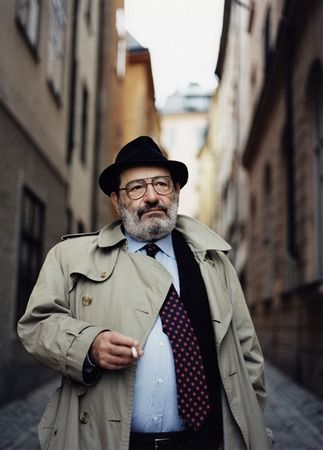Umberto Eco an outstanding intellectual who influenced the study of semiotics and memory
- Umberto Eco was born 5 January, 1932 in the city of Alessandria, in the Italian region of Piedmont, in the middle of Genova, Milan and Turin triangle.
- He died in Milan, in 19 February, 2016
- Umberto Eco by Ulla Montan
- Eco never founded a semiotics school, but his thought has heavily influenced the field of semiotics, in many areas, like no other's.
- As for Eco's contribution to the study and popularization of semiotics,
- Rocco Capozzi (2016), observes:
- "Eco was a much admired icon of culture, a most respectable author, a beloved professor, an outstanding speaker [...], the epitome of an intellectual who could fuse erudition and popular culture, especially in the genre or historical thrillers"
- To the often-asked question of why people would buy and read his difficult novels, Eco replied, "people are tired of simple things. They want to be challenged" (The Guardian, November, 30, 2011).
- His unique style was grounded in his unmatchable skills of "docere et delectare", Socratic dialogues, figurative language, metaphorical discourse, irony, digressions, intertextuality and intratextuality, and in his art of constructing what [Capozzi terms] "hybrid cognitive encyclopedia histotical fiction".
- In Italy, Eco modernnized literature [and] popularized the studies of semiotics, [...], remained the expert of popular culture and mass communication.
- Eco was regarded as one of the sharpest and most discerning analysts of contemporary society.
- Umberto Eco dominated the cultural arena for nearly half a century because he was a polymath with an incredibly encyclopedic mind.
- His "A Theory of Semiotics" put Italy on the map as a center of studies for the science of perceiving and interpreting all sorts of verbal and visual signs"
- Eco's "A Theory of Semiotics" (1975) and "Semiotics and the Philosophy of Langauge" (1984), became key manuals worldwide for the science of interpreting signs.
- In 1997, with "Kant and the Platypous", "a book full of stories", as Eco puts it, he revisits Peirce and his theory of signs, and bookended his many years of studies and promotion of semiotics. Eco was now referring to semiotics no longer as a science or discipline, but as a humanities department, where several approaches and theories from the social sciences interwine.
- Eco is one of the primary reasons why Dan Brown became an international phenomenon with "The Da Vinci Code"
- In October 2013, the distinguished professor, linguist, translator, author, medievalist, historian, philosopher, semiotician, language and communication expert, delivered a lecture for the Italian delegation to the UN "against the loss of memory"
- https://youtu.be/0R1pwVAuUmM?si=zN2txTThjyElUw9s
- In this lecture, he pointed out that:
- "In order to preserve its identity, a culture must not only act as a stock of information, but also as a filter. The history of civilizations is a sequence of obysses into which tons of knowledge went missing"
- "In general, the function of social and cultural memory is to act as a filter; it's not to preserve memory"
- "A mature culture decides to put some information in a latency state"
- "The latency places are represented by the model of a library or of the archive as the indispensable containers of a wisdom that can be revisited even though it was not revisited for centuries"
- For Eco, censorship is no longer exercised through concealment or disappearance, but in the form of propagation. If you want to destroy the news, all you have to do is squeeze it among other news (Eco, 1991)
- Rocco Capozzi (2016) posits that, "[Eco] has been an acute observer of [...] social and cultural history who faced death with admirable serenity"
- On Memory,
- Eco (1991) has speculated that: what will happen when the entire humankind is behind a computer screen? A bibliography comprised of twenty works is very useful because the reader will choose three books to study. Where will a bibliography of 10.000 works that appears immediately, end up? In the trash can (Ταχυδρόμος, 1991).
- Rocco Capozzi (2016), systematized some heavily influential thoughts of Eco on history and memory:
- "The Mysterious Flame of Queen Loana" (2004), was constructed entirely around different types of memory, memory loss, search for identity, cultural history, and daily life under Fascism"
- In 2006, Eco published a collection of his studies on memory, "La memoria vegetale". Eco [also] wrote "a Bustina", addressed to his grandson:
- "Caro nipote, studia a memoria" (January 3, 2014), in which he explains to the young boy different types of memory and tells him not to rely on the Internert and technology for the act of remembering.
- Eco tried to explain the dangers of an unfiltered Internet that gives voice to idiots and space to a barrage of articles full of lies and inaccuracies.
- In May, 2015, at the Bienale in Venice, with the aid of the director of Davide Ferraris, Eco appeared in three short videos talking about memory. In the third video, we hear Eco say: "We are our memory. "If we lose our memory, we lose our soul" and, "when I die, I will remember everything".
References:- Capozzi, R (2016). Umberto Eco: Acute Observer of Our Social and Cultural History. Italica, 93(1), 5-22. http://www.jstor.org/stable/43896080.
- Eco, O. (1991). Στο Όνομα του Κομπιούτερ. Ταχυδρόμος, 6. 11. 1991. Ιστορικό αρχείο "Το Βήμα" & "Τα Νέα"
- UN Web TV. Against the Loss of Memory: A Lecture by Professor Umberto Eco. 21 October 2013. Against the Loss of Memory: A Lecture by Professor Umberto Eco | UN Web TV.






Comments
Post a Comment